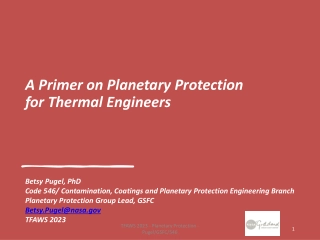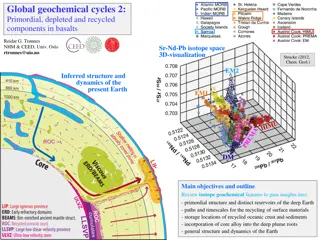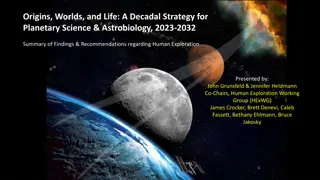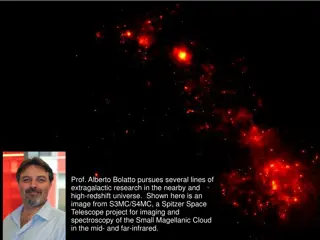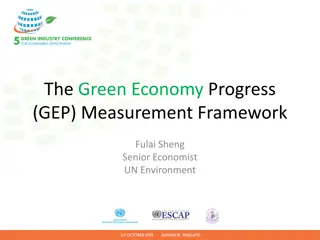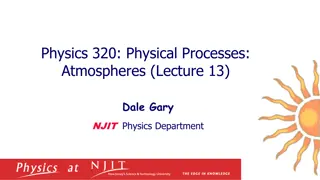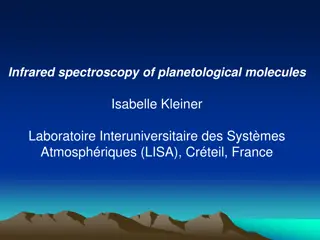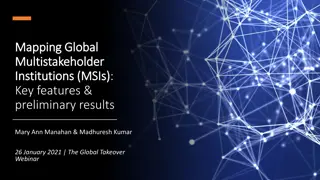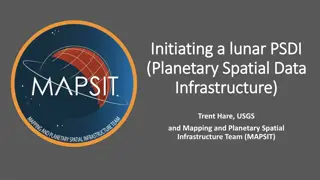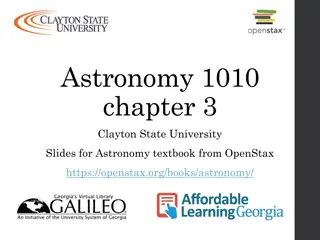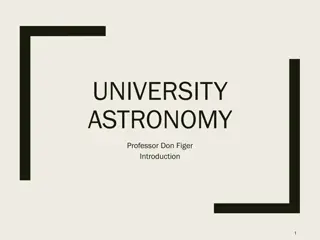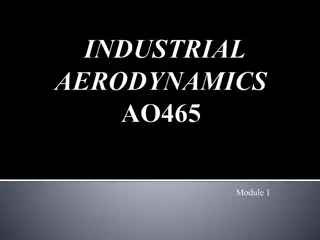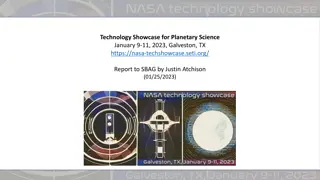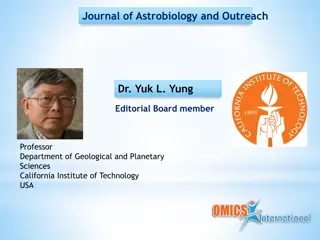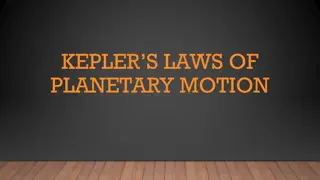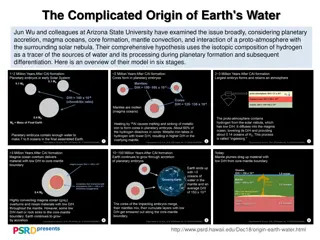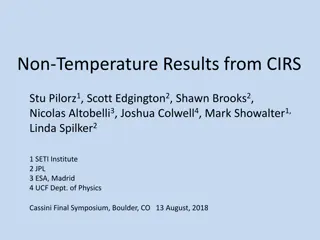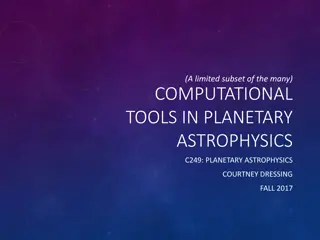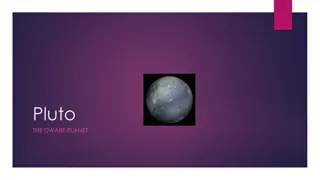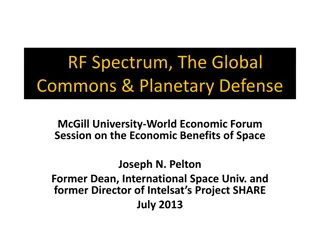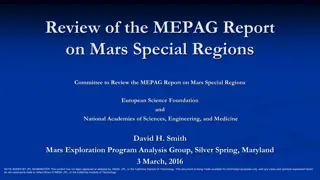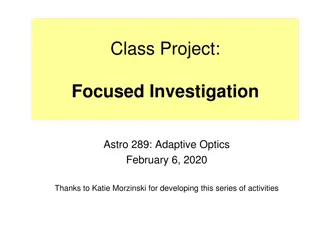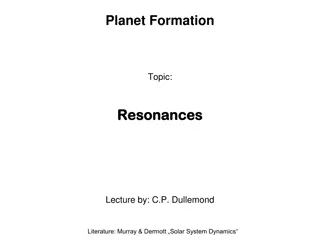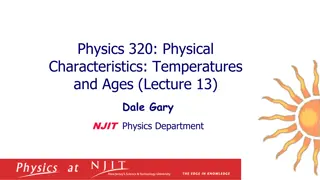Aerodynamic Challenges in Venus Exploration
Investigating aeroshells for Venus entry, descent, and deployment to overcome challenges. Technology developments for efficient and robust heatshield systems, enabling successful atmospheric missions. Discusses the demands of Venus entry compared to other planetary bodies. Engineering solutions and
2 views • 14 slides
❤[PDF]⚡ Planetary Ring Systems (Springer Praxis Books)
\"COPY LINK HERE ; https:\/\/getpdf.readbooks.link\/B001941UHI\n\n[PDF READ ONLINE] Planetary Ring Systems (Springer Praxis Books) | Planetary Ring Systems (Springer Praxis Books)\n\"\n
0 views • 6 slides
A Primer on Planetary Protection for Thermal Engineers
Delve into the realm of planetary protection with this comprehensive primer tailored for thermal engineers by Betsy Pugel, PhD. Explore the intersection of thermal and planetary protection, flight project practicalities, and the crucial components of forward and backward contamination. Gain insights
1 views • 48 slides
Overview of Distributed Systems: Characteristics, Classification, Computation, Communication, and Fault Models
Characterizing Distributed Systems: Multiple autonomous computers with CPUs, memory, storage, and I/O paths, interconnected geographically, shared state, global invariants. Classifying Distributed Systems: Based on synchrony, communication medium, fault models like crash and Byzantine failures. Comp
9 views • 126 slides
Insights into Earth's Geochemical Cycles and Isotopic Evolution
Explore the primordial, depleted, and recycled components in basalts to understand deep Earth reservoirs, recycling paths, and core-mantle dynamics using isotope geochemistry. Learn about radioactive decay systems, mantle array evolution, and U-Th-Pb systematics in planetary differentiation.
6 views • 30 slides
Understanding Information Systems in Organizational Management
Management in organizations is divided into three levels: operational, tactical, and strategic. Each level requires different information systems to support various activities. Operational systems focus on routine transactions and control processes, while middle-level systems aid in semi-structured
9 views • 39 slides
Exploration Strategy for Planetary Science & Astrobiology 2023-2032
The decadal strategy outlines a comprehensive plan for planetary science and astrobiology, emphasizing the integration of human exploration activities with scientific objectives. Key elements include leveraging planned human space missions for new scientific opportunities and identifying areas of pl
9 views • 10 slides
Understanding Different Types of Recommender Systems
Recommender systems play a crucial role in providing personalized recommendations to users. This article delves into various types of recommender systems including Collaborative Filtering, Content-Based, Knowledge-Based, and Group Recommender Systems. Collaborative Filtering involves making predicti
0 views • 7 slides
Introduction to Embedded Systems Design
Embedded Systems Design, Chapter 1 provides an insightful overview of embedded systems, distinguishing them from general-purpose computers. The chapter delves into the characteristics of embedded systems, their design considerations, and the various types of embedded computers such as general-purpos
1 views • 7 slides
Addressing Controversial Topics in Planetary Science
Explore the challenges of addressing controversial topics in planetary science during public engagement, including misunderstandings about science and the nature of scientific inquiry. Discover solutions and engage in activities to enhance public understanding.
0 views • 15 slides
Fascinating Research in Astrophysics and Planetary Science
Prof. Alberto Bolatto explores extragalactic research, Prof. Drake Deming studies extrasolar planets, Dr. Tony Farnham specializes in cometary studies, Lori Feaga maps cometary gas comae, Prof. Suvi Gezari investigates supermassive black holes, and Prof. Douglas Hamilton delves into planetary dynami
0 views • 23 slides
The Green Economy Progress Measurement Framework Overview
The Green Economy Progress (GEP) Measurement Framework, spearheaded by Fulai Sheng, a Senior Economist at UN Environment, emphasizes an Inclusive Green Economy (IGE) as a tool for sustainable development. It addresses poverty, inequitable prosperity sharing, and planetary boundary concerns by integr
0 views • 6 slides
Understanding Atmospheric Physics: Ideal Gas Law and Maxwellian Distribution
Exploring the physics of gases in planetary atmospheres, this lecture delves into the ideal gas law which relates pressure, density, and temperature in an atmosphere. It introduces the concept of kinetic temperature and Maxwellian distribution, showcasing how gas particles distribute in equilibrium.
0 views • 12 slides
SAASTA AstroQuiz 2017 Round 3: Planetary Knowledge Challenge
Participate in the SAASTA AstroQuiz 2017 Round 3 and test your planetary knowledge with a series of questions related to various celestial bodies. You have 60 seconds to answer each question. Use the provided image for reference and enjoy the space-themed quiz! Remember, no internet or cellphones al
0 views • 34 slides
Understanding Planetary Gear Trains in Hybrid Powertrains
Hybrid powertrains utilize planetary gear trains to achieve different operating modes such as motor-alone, engine-alone, combined mode, and more. These gear trains consist of planetary gears orbiting around a central axis, enabling multiple shaft configurations for input and output. Understanding th
0 views • 55 slides
Understanding Planetary Health, Climate Change, and Pandemics
This educational content delves into the concepts and principles of planetary health and climate change, exploring the interrelationships between ecosystems, animals, and human health. It highlights the far-reaching effects of human and animal interactions on the environment, emphasizing practical i
0 views • 20 slides
Insights into Infrared Spectroscopy of Planetary Molecules and Space Exploration
Infrared spectroscopy plays a crucial role in studying planetary molecules like NH3, PH3, and CH3CN, aiding in planetary observations and spacecraft missions. Ground-based observatories and spacecraft like GALILEO and Cassini/Huygens provide valuable data for analyzing planetary spectra and modeling
0 views • 13 slides
Global Multistakeholder Institutions: Key Features and Insights
This content focuses on global multistakeholder institutions (MSIs), their key features, stakeholder influence, decision-making dynamics, and typologies. It also explores the involvement of various entities in MSIs and their impact on critical issues such as food systems, planetary health, and marke
0 views • 10 slides
Information Systems in Organizations: Overview and Implementation
Information systems play a crucial role in organizations, encompassing transaction processing systems, functional area information systems, and enterprise resource planning systems. This content delves into the purpose of transaction processing systems, the support provided by information systems ac
0 views • 30 slides
Initiating a Lunar Planetary Spatial Data Infrastructure (PSDI) by MAPSIT Steering Committee
MAPSIT, led by Trent Hare of USGS, advocates for creating a Lunar PSDI to enhance spatial data infrastructure in planetary science. The committee highlights the importance of foundational lunar data products and ongoing efforts for Europa and the Moon. Collaboration with various entities is emphasiz
0 views • 10 slides
Johannes Kepler and His Revolutionary Laws of Planetary Motion
Johannes Kepler, a pivotal figure in the history of astronomy, made groundbreaking discoveries by overturning the geocentric model of the universe. By formulating his three laws of planetary motion, Kepler paved the way for scientific advancements and paved the path for Isaac Newton's law of gravity
0 views • 12 slides
University Astronomy Course with Professor Don Figer: Introduction and Information
Join Professor Don Figer for an introductory course in astronomy and astrophysics. Explore topics such as celestial mechanics, planetary systems, stars, cosmology, and more. Learn from an experienced instructor and engage with hands-on activities to deepen your understanding of the universe.
0 views • 25 slides
Understanding Newton's Law of Gravitation and Kepler's Laws of Planetary Motion
Explore the gravitational constant, force of attraction between objects, and equations for calculating gravitational force and centripetal force. Delve into Kepler's laws describing planetary orbits. Uncover the relationship between periods and distances of planets from the sun.
0 views • 9 slides
Understanding the Planetary Boundary Layer in Atmospheric Science
The Planetary Boundary Layer (PBL) plays a crucial role in atmospheric dynamics, divided into surface, mixed, stable, and residual layers. During the day, the mixed layer experiences convective motions due to surface heating, while the stable layer dominates during the night. Understanding these lay
0 views • 18 slides
Successful Technology Showcase for Planetary Science - A Networking Triumph
Attendees of the Technology Showcase for Planetary Science, held in Galveston, TX, praised the event for fostering connections between technologists and mission planners. Organized by Carolyn Mercer and Doris Daou, this innovative gathering aimed to enhance future mission science returns through col
0 views • 9 slides
Dr. Yuk L. Yung - Professor of Astrobiology and Planetary Sciences
Dr. Yuk L. Yung is a distinguished editorial board member and professor at the California Institute of Technology, USA. His research focuses on planetary evolution, atmospheric chemistry, astrobiology, and global change, emphasizing synergistic interactions between modeling, experiments, and observa
0 views • 21 slides
Understanding Kepler's Laws of Planetary Motion
Explore the fundamental laws discovered by Johannes Kepler in his study of planetary motion. Learn how these laws revolutionized our understanding of the solar system, from the elliptical orbits to the equal area law. Discover the key concepts of focus, eccentricity, aphelion, and perihelion, sheddi
0 views • 21 slides
Understanding Universal Gravitation and Planetary Motion
Explore the principles of Newton's Law of Universal Gravitation and Kepler's Laws of Planetary Motion. Delve into the concept of gravitational attraction between celestial bodies and the validation of these laws through the conservation of angular momentum. Learn about the measurement of the gravita
0 views • 20 slides
Exploring Classical Mechanics in Physics
Delve into classical mechanics with topics ranging from helicopter dynamics and bicycle dynamics to inclined planes and the principles of Newton's laws of motion. Learn about the unique characteristics of instruments like the pianoforte and the foundational principles governing linear and angular mo
0 views • 14 slides
The Complicated Formation of Earth's Water: A Detailed Overview
Jun Wu and colleagues at Arizona State University have developed a comprehensive model to explain the origin of Earth's water through stages such as planetary accretion, core formation, and interactions with the solar nebula. By tracing the isotopic composition of hydrogen, they explore how water so
0 views • 7 slides
Non-Temperature Results From CIRS Research Symposium
Rings around Icy Moons are studied through detailed observations and analyses by a team of researchers from various institutions. The study focuses on the IR emissivity results, occultation observations, and beta factor analysis carried out using the CIRS instrument. The rings are noted to emit in a
0 views • 34 slides
Computational Tools in Planetary Astrophysics - Fall 2017
Explore a limited subset of computational tools in planetary astrophysics used for modeling planetary transits, secondary eclipses, phase curves, radial velocities, Bayesian parameter estimation, and atmospheric modeling. Tools include BATMAN, SPIDERMAN, RadVel, e.emcee, and Exo_Transmit, each servi
0 views • 7 slides
World Breastfeeding Week 2020: Promoting Sustainable Solutions for People and Planet
The World Alliance for Breastfeeding Action (WABA) coordinates the annual World Breastfeeding Week campaign, aligning it with the UN Sustainable Development Goals. The WBW-SDGs Campaign focuses on the interconnected nature of breastfeeding and planetary health, emphasizing the role of breastfeeding
0 views • 18 slides
Understanding Embedded Systems and Cyber-Physical Systems
Embedded systems are specialized computer systems embedded within larger systems, such as control systems and car controllers. This lecture covers real-time aspects, applications of Cyber-Physical Systems (CPS), and examples like the Boeing 777/Airbus A380 cockpit. It discusses the design process of
0 views • 22 slides
The Fascinating Story of Pluto: Discovery, Naming, and Its Planetary Status
In 2006, Pluto was reclassified as a dwarf planet, sparking debates about its planetary status. Discovered in 1930 by Clyde Tombaugh, Pluto was named after the Roman god of the underworld by an 11-year-old girl. Its composition and size differentiate it from the traditional outer planets, contributi
0 views • 5 slides
The Economic Importance of Space Technology and Planetary Defense
Space technology plays a crucial role in global economics by addressing cosmic threats, climate change, and atmospheric issues. The protection of global resources like RF Spectrum, the Ozone Layer, and the Van Allen belts is essential for human survival. Potential risks from orbital debris, solar fl
0 views • 10 slides
Review of MEPAG Report on Mars Special Regions Committee
The MEPAG Report on Mars Special Regions Committee was established by joint requests from ESA, ESF, and NASA to review planetary protection requirements for Mars. The Academies and ESF play a crucial role in providing independent scientific advice. The Joint Committee comprises experts from various
0 views • 14 slides
Exploring Adaptive Optics Systems in Astronomy: Comparative Analysis of AO Systems for HR 8799 Planetary System
Delve into the world of adaptive optics (AO) systems through a focused investigation on imaging the HR 8799 planetary system. Compare and contrast different AO systems, discuss science goals and design choices, and analyze observational details and results. Explore which AO system is optimal for HR
0 views • 27 slides
Understanding Resonances in Planet Formation
Resonances play a crucial role in planetary systems, where characteristic frequencies align to produce dynamical consequences. Mean motion resonances, spin-orbit resonances, and secular resonances are key examples influencing planetary dynamics. Explore resonant angles, resonant arguments, and examp
0 views • 17 slides
Understanding Surface Temperatures and Albedo in Planetary Systems
Surface temperatures and albedo play significant roles in understanding planetary characteristics. Albedo, the fraction of sunlight reflected from a planet's surface, varies among planets. By considering factors like albedo, distance from the Sun, and energy flux, we can estimate surface temperature
0 views • 10 slides
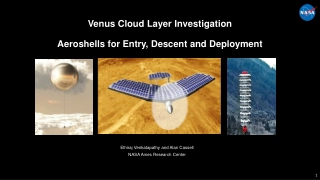
![❤[PDF]⚡ Planetary Ring Systems (Springer Praxis Books)](/thumb/21506/pdf-planetary-ring-systems-springer-praxis-books.jpg)
